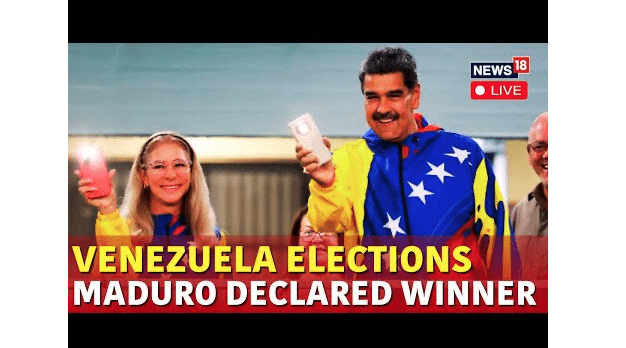A delegation of five election observers from the National Lawyers Guild (NLG) monitored the presidential elections in Venezuela that took place on July 28, 2024. The delegation observed a transparent, fair voting process with scrupulous attention to legitimacy, access to the polls, and pluralism.
Despite the soundness of the electoral process, the U.S.-backed opposition, with support from an anti-Maduro Western press, has refused to accept the results, undermining the stability of Venezuela’s democracy. The president of the Consejo Nacional Electoral (CNE), Elvis Amoroso, called upon the attorney general to investigate the attacks on the electoral transmission system. The delegation strongly condemns these attacks on the electoral system as well as the role of the U.S. in undermining the democratic process.
The official election results were announced shortly after 12 am on July 29: President Nicolas Maduro has been re-elected with a 51.2% share of the vote; his leading challenger, Edmundo Gonzales, took 44.2% of the vote, with turnout approximately 59% throughout the country with a voting electorate of over 21.3 million people.
The delegation visited several polling sites in Caracas and La Guaira and shared notes and information with the 910 electoral observers present from 95 countries and many organizations, including the Carter Center, the United Nations, the African Union, and the Latin American Council of Electoral Experts (CEELA).
“The Venezuelan elections today were not only fair and transparent but also represented an example of popular civic participation. Their successful outcome is a triumph for the Venezuelan people, especially considering the level of U.S. interference and attempted sabotage of the democratic process, particularly through sanctions and coercive economic measures aimed at producing ‘regime change’ in Venezuela,” said Suzanne Adely, President of the NLG and a member of the delegation.
During the delegation’s visits to polling sites, members spoke freely with voters, including supporters of both the government and the opposition. We found that voters across the board expressed strong confidence in the electoral system and did not note any problems or hindrances to casting their ballots.
The electoral system was highly transparent and well-facilitated, overseen by the Consejo Nacional Electoral (CNE), the fifth branch of the Venezuelan government, which manages the electoral process. The voting system in Venezuela, dubbed “the best in the world” by former U.S. President Jimmy Carter, ensures both access to the polls and clear identification of voters, promoting a secure system that inspires confidence in the Venezuelan public. Notably, Venezuelans cast both an electronic vote and a printed paper ballot in order to verify electoral totals, a check that is performed automatically at 54% of polling locations, chosen at random. The machines and electoral processes functioned properly at each of the polling sites visited by the delegation.
The high level of security at the polls is combined with a commitment to accessibility for all Venezuelan citizens, the delegation observed. People with disabilities, small children and the elderly may access their polling station through fast-track lines. For people with special needs who require physical assistance to cast their votes, there is also a system called “assisted voting” that allows voters to either bring a family member or the president of the voting station into the voting booth to assist with the process, and the delegation witnessed two examples of assisted voting throughout the day.
Any difficulties that we witnessed at the polls were normal and routine in all electoral systems. At the majority of polling sites we visited, wait times were relatively low (under 5 minutes) throughout the day, although there were surges in turnout leading to longer waits at times. Those with special needs were accommodated through a fast-track line. Longer and shorter wait times at the polls took place across neighborhoods, and when there were longer lines, the delegation did not witness any participants that decided not to vote due to waits.
The delegation underlined its absolute rejection of claims of fraud being promulgated by the U.S.-backed opposition, right-wing forces in the region, including the Lima group, U.S. officials including Secretary of State Antony Blinken, and Western media.
The delegation has produced a brief and thorough report (forthcoming at nlginternational.org) expanding on the election process as well as attempts to interfere by the opposition, the United States government, and Western media. “It’s imperative that we act in solidarity to protect democracy and the sovereignty of this Caribbean nation, reject U.S. imperialist intervention in Venezuela, and call for an end to U.S. sanctions and blockades,” said Adely.
The National Lawyers Guild has previously monitored Venezuelan elections in 2021, 2015, and 2013 and co-organized a fact-finding trip in 2023 to monitor the effects of sanctions on the country.
The National Lawyers Guild, whose membership includes lawyers, legal workers, jailhouse lawyers, and law students, was formed in 1937 as the United States’ first racially-integrated bar association to advocate for the protection of constitutional, human and civil rights
Suzanne Adely [email protected]
Ken Montenegro [email protected]

